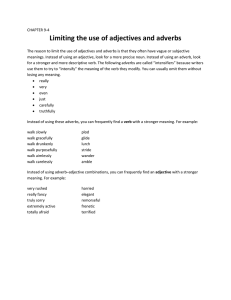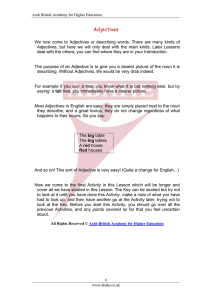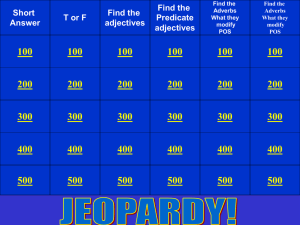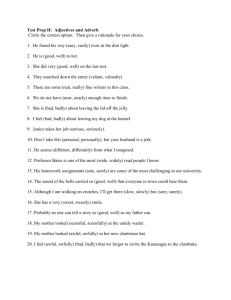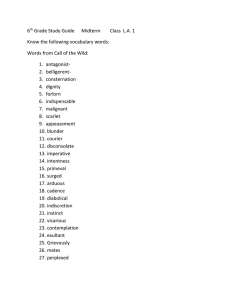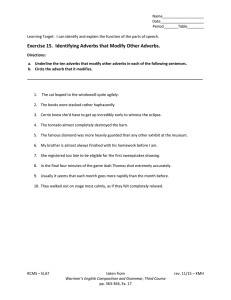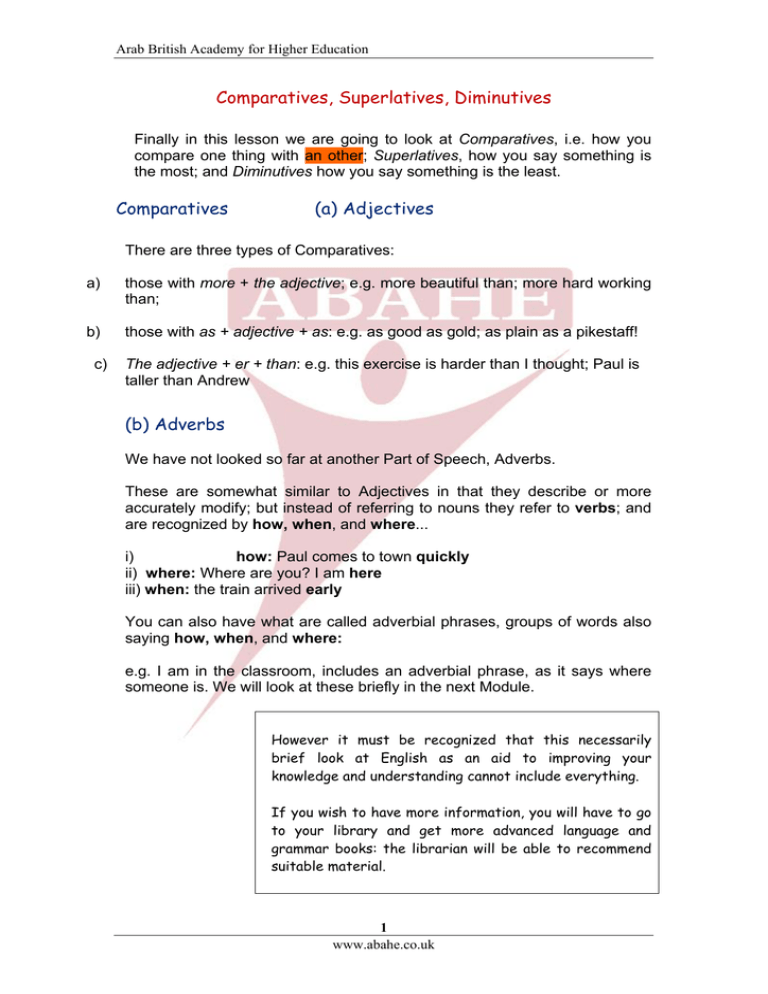
Arab British Academy for Higher Education
Comparatives, Superlatives, Diminutives
Finally in this lesson we are going to look at Comparatives, i.e. how you
compare one thing with an other; Superlatives, how you say something is
the most; and Diminutives how you say something is the least.
Comparatives
(a) Adjectives
There are three types of Comparatives:
a)
those with more + the adjective; e.g. more beautiful than; more hard working
than;
b)
those with as + adjective + as: e.g. as good as gold; as plain as a pikestaff!
c)
The adjective + er + than: e.g. this exercise is harder than I thought; Paul is
taller than Andrew
(b) Adverbs
We have not looked so far at another Part of Speech, Adverbs.
These are somewhat similar to Adjectives in that they describe or more
accurately modify; but instead of referring to nouns they refer to verbs; and
are recognized by how, when, and where...
i)
how: Paul comes to town quickly
ii) where: Where are you? I am here
iii) when: the train arrived early
You can also have what are called adverbial phrases, groups of words also
saying how, when, and where:
e.g. I am in the classroom, includes an adverbial phrase, as it says where
someone is. We will look at these briefly in the next Module.
However it must be recognized that this necessarily
brief look at English as an aid to improving your
knowledge and understanding cannot include everything.
If you wish to have more information, you will have to go
to your library and get more advanced language and
grammar books: the librarian will be able to recommend
suitable material.
1
www.abahe.co.uk
Arab British Academy for Higher Education
One excellent book, though old fashioned is:
English on the Anvil by J.N.Britton (John Murray)
This is almost certainly out of print but your library
could either get hold of a copy for you, or recommend a
more modern alternative. There are plenty of good
English grammars in the bigger bookshops or public
libraries.
Comparison of Adverbs
Adverbs usually end in ly e.g. quickly, slowly, and so on, and so are not too
difficult to identify; they will also be closely linked with a verb: e.g. John
works quickly.
But if an adverb is being compared, it is more difficult to recognize, as it will
often end in er or est, and so look exactly like an adjective. You have to see
what it is actually doing to see if it is an adjective or adverb.
Examples
a) This boy works much harder than the others
(Answering how he works)
b)
The train arrived earlier than I expected
(Answering when it arrived)
c) The sea was much nearer than John told me.
(Answering where the sea was)
Superlatives
We have not looked at the Diminutives of Adjectives but will do so shortly:
before that we will finish our quick look at the Superlatives of Adverbs:
1)
He worked the hardest of all the team (how)
2)
This bus leaves town earliest (when)
3) I was nearest to the door (where)
Diminutives of Adjectives
1) This was the smallest of all the ships.
2
www.abahe.co.uk
Arab British Academy for Higher Education
2)
Money is the least of my problems (from less)
Irregular Adjectives and Adverbs
Here is a table of the most common Irregular Adjectives and Adverbs; the
Comparatives and Superlatives will be the same whether Adjective or
Adverb, but see above for differences in use:
ADJECTI
VE
good
bad
less
ADVER
B
well
badly
COMPARATI
VE
SUPERLATI
VE
better
worse
lesser
best
worst
least
less
As usual the last Activity practises the previous topic, here the Comparison
of Adjectives and Adverbs, as well as the others, the Simple Past Tense and
the Present Perfect. Answer the following questions: you have the Key after
this Lesson:
Activity 3
1 Put these sentences into the Simple Past Tense
a)
We do not abandon our friends
b)
I see the man drive through a red traffic light
c) The ball breaks the window
d)
Can you please leave at once?
2 Put the following sentences into the Present Tense; (there
may be more than one answer)
a)
Have you visited what I have described?
b)
The maid has brought in the tea
c) We have not seen that beautiful lake
d)
Today we have gone shopping
3 Complete these sentences with the correct comparative or
superlative:
a)
This is the (nasty) accident I have seen in years!
3
www.abahe.co.uk
Arab British Academy for Higher Education
b)
c)
d)
e)
I have ____ good a chance _____ anyone else
This problem is (big) than both of us!
Which is the (good) way of solving this?
(Less) said soonest mended !
f)
Mary was the (hard) working student in her class
g)
On Fridays we go home (early) than on the other days
h) The river is (far) than the station
KEY
Activity One
a)
b)
the Simple
c)
d)
fertile land.
e)
f)
g)
h)
i)
We often sought, but less often found
The best people did not boast of their achievements (Even
Past needs did in negatives)
Was he able to do this exercise? No, he could not
The farmer did not sow seed in stony ground; he preferred
Did you know what this meant? Yes, I knew it very well
Philip only spoke when he was spoken to
I had £5 left; how much had you got? (did you have?)
Mary cut the paper with her little scissors
You told me the truth and I found it unpleasant
Activity Two
a)
come better,
b)
c)
d)
e)
f)
g)
cloakroom
h)
i)
j)
Have you been able to come here a moment? (Could you
but this is practice of Present Perfect...)
The girl has cut her finger with a kitchen knife
What have you done these days?
In Treasure Island the pirates have hidden treasure
The patient has not wanted to eat today
The parents have given their children attractive gifts
Where have you left our coats? We have left them in the
With my new glasses I have been able to see more clearly
Those who have hidden have been able to find!
They have not written many letters
Activity Three
1
a)
b)
c)
d)
We did not abandon our friends
I saw the man drive through a red traffic light
The ball broke the window
Could you please leave at once?
4
www.abahe.co.uk
Arab British Academy for Higher Education
a)
b)
c)
d)
2
Are you visiting (do you intend to visit)* what I am describing? (continuous
form is best...)
The maid brings (or is bringing) in the tea (continuous more vivid)
We are not seeing that beautiful lake
Today we are going shopping
*This is a common use of the continuous
3
a)
This is the nastiest accident I have seen in years!
b)
I have as good a chance as anyone else
c)
This problem is bigger than both of us
d)
Which is the best way of solving this?
e)
Least said soonest mended
f)
Mary was the hardest working student in her class
g)
On Fridays we go home earlier than on other days
h) The river is farther (further) than the station
All Rights Reserved © Arab British Academy for Higher Education
5
www.abahe.co.uk

